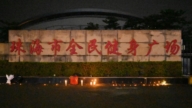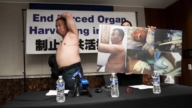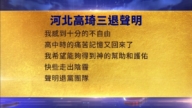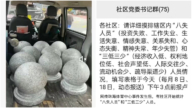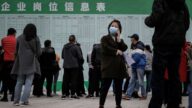【新唐人2012年11月15日訊】十八大期間,《人民日報》在同一篇文章裏提到,「任何組織和個人都沒有超越法律的特權」和「法治強調黨的事業至上」,以及「黨制定法律」,聼起來自相矛盾。不過,在中共執政的60年中,司法一直無法獨立,而在當下的權力交接中,官方發出的這種論調,百姓們會再次相信嗎?
近期大陸媒體罕見的就法制和司法公正問題連續發表文章。《人民日報》11月12號發表評論文章「社會主義法治強調黨的事業至上」。
文中說,「社會主義法治堅持法律面前人人平等……任何組織和個人都沒有超越憲法和法律的特權。」
但緊接著下一段卻自相矛盾的説「社會主義法治強調的是黨的事業至上、人民利益至上、憲法法律至上」。
在重慶打黑中被冤判的大陸知名刑辯律師李莊指出,所謂的「至上」破壞法的公平。
大陸刑辯律師李莊:「因爲『法』,它是一個鐵面無私的東西,它是一個公平的代名詞。如果你老體現誰誰誰的利益,體現誰誰誰的至上,那就失去了『法』的一種公平,『法』的概念就被破壞了。」
北京律師浦志強也對海外媒體表示,「三個至上」是互相矛盾的,最高點不可能同時有三個,說穿了就是只有黨的利益至上,實際上,黨最大的事業就是永保執政地位。
《人民日報》的文章還說「多黨輪流執政、兩院制和三權分立不適合中國國情」。而國內律師們指出,中國的法院目前是在政法委的控制下,公檢法之間的制衡失效,這種制度無法給中國產生出獨立的司法。
大陸維權律師劉曉原:「司法獨立必須要三權分立。我們所說的『獨立』,實踐中你也看得出來,司法是根本不可能獨立的。他已經談到了黨的領導,公檢法要受政法委的領導,這個是不可能做到獨立的。如果涉及維穩的案件,涉及到政府職權的案件,司法碰這個就很難了。」
大陸維權律師唐荊陵:「你又沒有監督,又沒有政黨的輪替。現在執政的,並且按照法律規定要永遠執政的政黨,萬世一系的政黨,它肯定要爲所慾爲的。『絕對權力,絕對腐敗』這是政治學上的一個真理。如果他堅持黨對司法的管控的話,那就不可能有司法獨立,也就不可能有公正。」
13號,《新華網》又報導了十八大新聞中心舉行的,主題為「中國的司法公正」網絡採訪活動。最高人民法院常務副院長在回答問題時表示,古今中外的司法制度,都不可能完全杜絕冤假錯案,中國的再審制度已經是最嚴的。
海外媒體分析,這是喉舌媒體在強調「黨的事業至上」的同時,一方面又呼籲中國百姓要對司法抱有信心。
不過,網友對這篇新聞的留言,大多都是「拍磚」的意見。
有網友直説「中國的冤假錯案其實不是人的問題,如果司法缺乏獨立性,自然就缺乏公正性!」。
也有網友說「人情,利益,政績和瀆職造成的冤假錯案。這是中國潛規則盛行的環境中的腐敗,也是最不願意承認和難以革除的毒瘤」。
採訪/李蓮 編輯/尚燕 後製/黎安安
China』s Judicial Justice: Under Supremacy of the Party』s Cause?
In the period of the 18th Party Congress,
the People’s Daily, published a paradoxical commentary.
The article stated “equality before rule of law”, “supremacy of
the Party’s cause”, and “the Party stipulates laws.”
In reality, China』s judiciary has never been truly independent
over the past 60 years.
The Chinese Communist Party has made such assertions
while holding its top power transition.
Will the Chinese public ever trust the Party again after this?
CCP official media has recently published a series of
articles about the rule of law and judicial justice.
On November 12, the People’s Daily』s commented on
“prioritizing the Party』s cause under socialist rule of law.”
The commentary said, “The socialist rule of law sticks to
equality before the law…….”
“No organization or individual has privilege above
the Constitution and laws.”
However, the article continued,
“The socialist rule of law puts the Party』s cause first, then
the interests of the people, then the constitution and laws.”
Li Zhuang, a lawyer known for being a victim of
Chongqing』s “anti-vice campaign”, comments.
The alleged “supremacy” actually ruins the impartiality of laws.
he says.
Li Zhuang: “The law is synonymous with impartiality.
If it』s always used to safeguard someone』s interests,
or to prioritize someone, it leads to a lack of impartiality
and destroys the whole concept of the rule of law.”
Beijing-based lawyer Pu Zhiqiang told overseas media that
CCP』s “three-supremacy” claim is contradictory.
The highest can only refer to one, instead of three.
The remark actually alludes to the Party』s interests that
always come first.
Maintaining its ruling status security forever is actually
the Party』s biggest cause, Pu Zhiqiang interprets.
The People’s Daily article stated, “The system of multi-party
rule, bicameral legislature and checks and balances does not conform to conditions in China.”
China』s lawyers affirmed that the existing judicial system is
controlled by the Political and Legal Affairs Committee(PLAC).
No checks and balances exist between public security organs,
procuratorates and courts, which gives no independent judiciary.
Liu Xiaoyuan: “Judiciary independence must be based on
checks and balances.
Currently in practice, there』s no judiciary independence at all.
The official media have clearly spoken of the leadership of
the Party, and the judiciary is under the lead of the PLAC.
If the case involves stability preservation or governmental
authority, the judiciary can hardly deal with it."
Tang Jingling (Human rights lawyer, China):
“There』s no supervision, no multi-party rule.
So the incumbent ruling party, which will rule China forever,
according to its law, will definitely do as it wants.
“Absolute power absolutely creates corruption,"
which is a universal truth in politics.
If the Party insists on controlling the judiciary,
you』ll never see an independent and impartial judiciary.”
On November 13, Xinhuanet.com covered online interviews
on the theme of “China’s judicial justice".
Vice executive president of the Supreme People’s Court
replied to some questions.
He said, a judicial system, at all times and in all countries,
never fully eliminates the possibility of unjust verdicts.
China has the most stringent retrial system in the world.
Overseas media commented that this is an official appeal
to the Chinese that have confidence in China』s judiciary.
Yet, this news was widely opposed by Chinese netizens.
one of whom posted, “China』s unjust verdicts were actually
not results made by people. No independent judiciary, no justice!”
Another netizen commented, “Unjust verdicts have been
consequences of personal connections,
along with private gains, political achievements
and dereliction of duty.
It』s a rot created by the prevailing hidden rules in China,
also a cancer that is most reluctantly admitted and hard to remove.”


